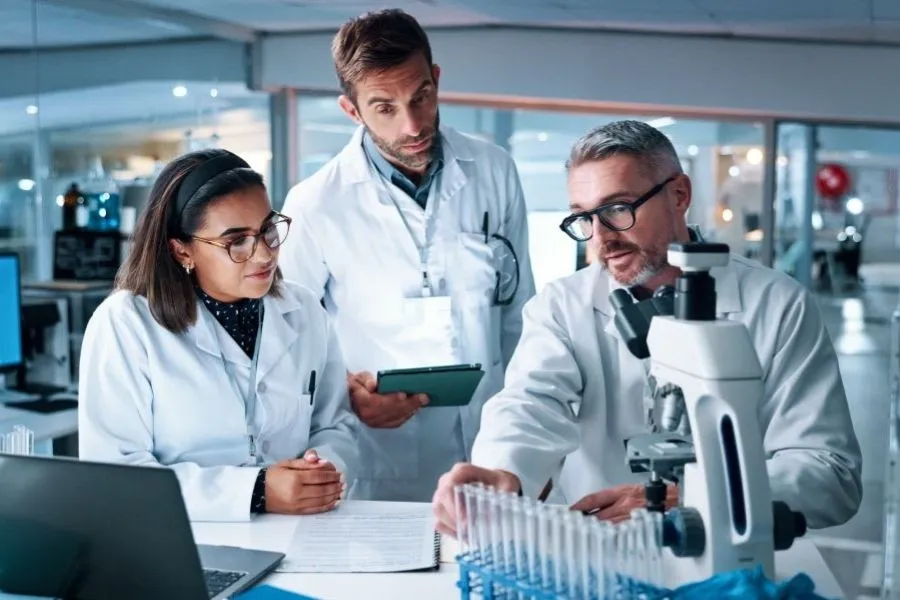Traditionally, HMOs have been studied for their role in beneficially modulating the microbiome, thereby influencing systemic health through immune modulation, gut barrier support, and potential cognitive benefits. However, emerging research reveals that HMOs can be detected systemically in the blood after oral administration, sparking renewed interest in their potential to deliver measurable health outcomes across various life stages.
At the same time, Innova Market Insights’ data suggest that global baby and toddler launches with HMOs grew 12% annually from 2019 to 2024, with Europe leading at 42%. Moreover, between 2023 and 2024, 64% featured immune health claims while 2’-Fucosyllactose (2’FL) remained the most commonly used HMO.
Ahead of Novonesis’ upcoming webinar, “Advancing HMO science with integrity: A look inside Novonesis’ labs,” Nutrition Insight sits down with the webinar’s presenters to discuss advancements in HMO research and science, the latest data from Novonesis’ labs, and its recent academic collaborations with University of California (UC) San Diego, US, and the University of Bonn, Germany.
Dr. Stina Rikke Jensen, Novonesis’ head of applied HMO science and innovation, and Dr. Yannik Schönknecht, the company’s senior scientific advisor for HMOs, reveal how their work highlights a rapidly expanding evidence base and a clearer view of how HMOs can be applied in infant, adult, and healthy aging nutrition.
For formulators and brand developers, Jensen and Schönknecht say the conversation signals where HMO innovation is heading and how it may reshape future product development.
Systemic benefits
According to Jensen and Schönknecht, HMOs have demonstrated the potential for systemic effects after entering the bloodstream, where they could modulate immune responses, reinforce the intestinal barrier, and potentially contribute to cognitive development.Dr. Stina Rikke Jensen, Novonesis’ head of applied HMO science and innovation.
“Our research has revealed that HMOs are not limited to their prebiotic role in shaping the gut microbiome,” they explain. “For example, we’ve observed that HMOs can act as decoys for undesirable microbes, blocking them from adhering to mucosal surfaces. By circulating through the body, HMOs could have the same function in other places”
“Additionally, their ability to interact with immune cells suggests a broader role in systemic immunity. These findings open up exciting possibilities for understanding how HMOs contribute to health beyond the gut.”
Bridging science and application
Jensen and Schönknecht highlight Novonesis’ commitment to closing the gap between scientific discovery and real-world application. With a comprehensive in-house research framework – including in vitro assays, in vivo experiments, gut models, and clinical trials – Novonesis investigates HMO mechanisms, validates findings in complex models, and confirms them in human studies. This approach ensures accurate, practical results.
“For infant nutrition, we focus on the benefits of HMOs found in human milk, such as supporting gut health and immune development,” they note. “For adults and healthy aging, we are exploring how HMOs can have an effect on cardiometabolic health by modulating systemic immunity, supporting cognitive function, and maintaining gut integrity.”
“By tailoring HMO formulations to specific life stages and health needs, we aim to deliver targeted, science-backed solutions that enhance overall well-being.”
Another way the company says it accomplishes this is the continued and meaningful collaboration with academia and research partners.
Strategic academic collaborations
Novonesis has entered into exciting collaborations with leading academic institutions, such as UC San Diego, US, and the University of Bonn, Germany. The company attests that these collaborations are central to its approach and provide access to advanced research environments while promoting multidisciplinary idea exchange.
“For instance, our recent review paper, developed in partnership with these institutions, synthesized key findings on HMO bioavailability,” underscore Jensen and Schönknecht. “These partnerships not only validate our research through external expertise but also ensure that our work aligns with the highest scientific standards.” Dr. Yannik Schönknecht, the senior scientific advisor for HMOs at Novonesis.
Dr. Yannik Schönknecht, the senior scientific advisor for HMOs at Novonesis.
“Together, we can push the boundaries of HMO science and translate these insights into meaningful health applications.”
Advancing lifespan wellness
The two scientists emphasize that the most transformative direction in HMO research is to move beyond their prebiotic effects on the microbiome and consider direct HMO-mediated impacts. The aim is to uncover their systemic effects and explore how they influence multiple physiological systems across the entire body.
Additionally, they state that understanding HMOs’ structure-function relationships will help guide the development of targeted, science-backed nutritional and therapeutic applications.
“As we delve deeper into how specific HMO structures influence immune modulation, cognitive development, and other systemic functions, we are redefining their role in nutrition,” conclude Jensen and Schönknecht. “This research has the potential to reshape how we approach health across the lifespan, from optimizing early life nutrition to supporting healthy aging.”
“By leveraging these insights, we can develop innovative, targeted solutions that can improve quality of life at every stage.”

